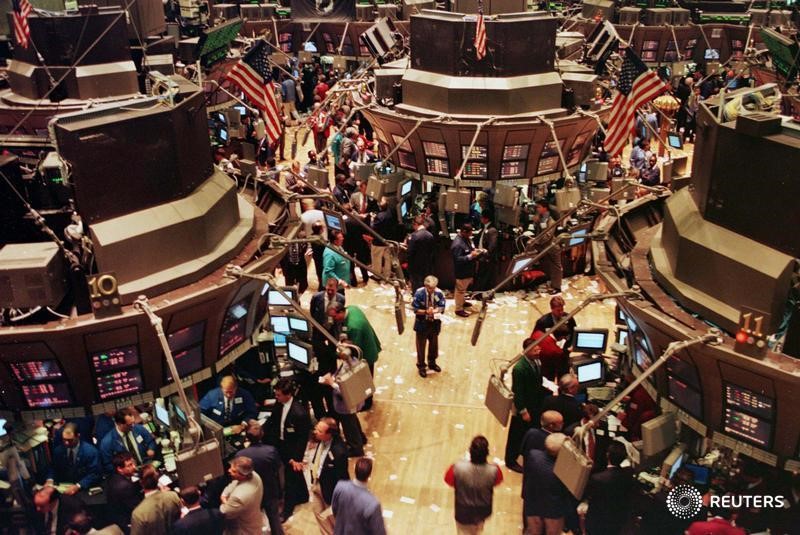* ECB monitoring nominal interest rates, Schnabel says
* Euro zone, U.S. 10-yr yields ease
* Australia's central bank tries to stem bond bleeding
* Emerging market stocks in biggest daily drop since May
* Graphic: World FX rates https://tmsnrt.rs/2RBWI5E
* Dollar lifted by rise in yields
* Bitcoin set for worst week since March
By Tom Arnold
LONDON, Feb 26 (Reuters) - Global stocks fell on Friday, with emerging market and Asia shares hardest hit, as a recent rout in global bond markets spooked investors amid fears the heavy losses suffered could trigger distressed selling in other assets.
MSCI's Emerging Markets equity index .MSCIEF suffered its biggest daily drop in nearly 10 months and was 3.1% lower, while European shares were deep in the red, with the STOXX 600 .STOXX down 1.1%.
The MSCI world equity index .MIWD00000PUS , which tracks shares in 50 countries, was 1.1% lower and heading for its worst week in a month.
U.S. futures pointed to a marginally positive open for Wall Street EScv1 , with S&P 500 e-minis up 0.1% EScv1 and futures for the tech-heavy Nasdaq up 0.2% NQcv1 . earlier saw the heaviest selling, with MSCI's broadest index of Asia-Pacific shares outside Japan .MIAPJ0000PUS sliding more than 3% to a one-month low, its steepest one-day percentage loss since May 2020.
For the week, the index was down more than 5%, its worst weekly showing since March last year when the coronavirus pandemic had sparked fears of a global recession.
"It is not the beginning of a correction in equities, more a logical consolidation as price-to-earnings ratios were excessive," said Francois Savary, chief investment officer at Swiss wealth manager Prime Partners.
"What is reassuring is that Q4 2020 earnings were good and earnings per share surprisingly good, and that means down the road we should get back to growth."
Friday's carnage was triggered by a whiplash in bonds as rising inflation expectations triggered a selloff of safe-haven debt.
The scale of the recent sell-off prompted Australia's central bank to launch a surprise bond buying operation to try to staunch the bleeding. Central Bank executive board member Isabel Schnabel reiterated on Friday that changes in nominal interest rates had to be monitored closely. benchmark yield was on course for its biggest monthly jump in three years.
Still, there were signs of respite. On Friday, 10-year German government bond yields DE10YT=RR were down 4 basis points at -0.248%. French FR10YT=RR and Austrian AT10YT=RR bonds were back in negative territory after both turning positive on Thursday for the first time since June.
Yields on the 10-year Treasury note US10YT=RR eased back to 1.4633% from a one-year high of 1.614% on Thursday.
"Bond yields could still go higher in the short term, though, as bond selling begets more bond selling," said Shane Oliver, head of investment strategy at AMP.
"The longer this continues, the greater the risk of a more severe correction in share markets if earnings upgrades struggle to keep up with the rise in bond yields."
Markets were hedging the risk of an earlier rate hike from the Federal Reserve, even though officials this week vowed any move was long in the future.
Even the thought of an eventual end to super-cheap money sent shivers through global stock markets, which have been regularly hitting record highs and stretching valuations.
"The fixed income rout is shifting into a more lethal phase for risky assets," says Damien McColough, Westpac's head of rates strategy.
"The rise in yields has long been mostly seen as a story of improving growth expectations, if anything padding risky assets, but the overnight move notably included a steep lift in real rates and a bringing forward of Fed lift-off expectations."
EMERGING STRAINS
Overnight, the Dow .DJI fell 1.75%, while the S&P 500 .SPX lost 2.45% and the Nasdaq .IXIC 3.52%, the biggest decline in almost four months for the tech-heavy index.
All of that elevated the importance of U.S. personal consumption data due later on Friday, which includes one of the Fed's favoured inflation measures.
Core inflation is actually expected to dip to 1.4% in January, which could help calm market angst, but any upside surprise would likely accelerate the bond rout.
The surge in Treasury yields caused ructions in emerging markets, which feared the better returns on offer in the United States might attract funds away.
Currencies favoured for leveraged carry trades all suffered, including the Brazil real and Turkish lira TRYTOM=D3 , which slid for a fifth straight day, erasing all the year's gains.
The flows helped nudge the U.S. dollar up more broadly, with the dollar index rising to 90.568. It also gained on the low-yielding yen, briefly reaching the highest since September at 106.42 JPY= . The euro EUR=EBS slid 0.6%.
With riskier assets under pressure, bitcoin BTC=BTSP fell 5% to $44,713, set for its worst week since March.
The jump in yields has tarnished gold, which offers no fixed return, and dragged it down 0.5% to $1,763.00 per ounce XAU= , headed for its second straight monthly decline.
Oil prices dropped on a higher dollar and expectations of more supply. O/R
U.S. crude CLc1 fell 2% to $62.26 per barrel and Brent LCOc1 lost 1.4% to $65.89.
<^^^^^^^^^^^^^^^^^^^^^^^^^^^^^^^^^^^^^^^^^^^^^^^^^^^^^^^^^^^ Asia stock markets
https://tmsnrt.rs/2zpUAr4 Asia-Pacific valuations
https://tmsnrt.rs/2Dr2BQA
^^^^^^^^^^^^^^^^^^^^^^^^^^^^^^^^^^^^^^^^^^^^^^^^^^^^^^^^^^^>
